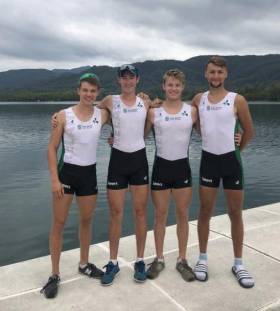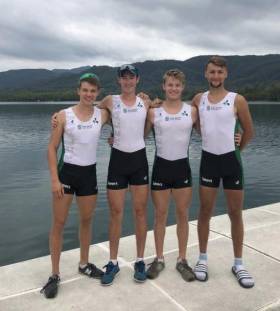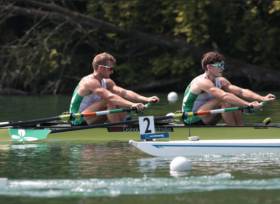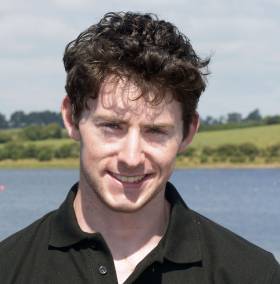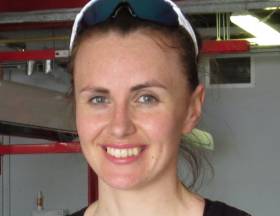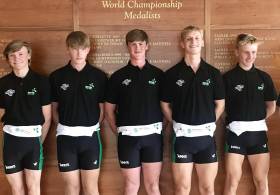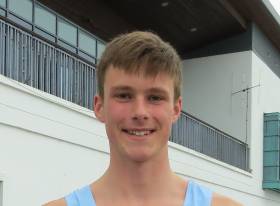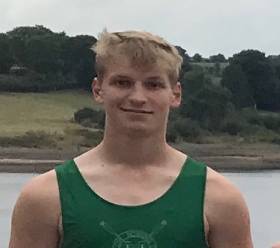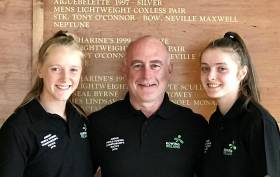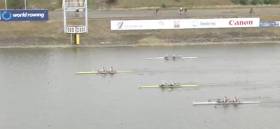Displaying items by tag: Ireland
Ireland Lightweight Quadruple Qualifies for World Rowing Final
#Rowing: Ireland’s lightweight quadruple of Fintan McCarthy, Ryan Ballantine, Jake McCarthy and Andrew Goff secured an A Final place at the World Rowing Championships in Plovdiv, Bulgaria, this morning. They took the second and final qualification place in their repechage. Turkey and Ireland showed they meant business right through the race, with only Algeria and then Norway showing signs of being able to upset this leading order. Turkey were excellent in the second half of the race, moving over a length clear of Ireland, who were content to find their way to the final.
World Rowing Championships, Plovdiv, Bulgaria, Day Four (Irish interest)
Lightweight Quadruple Sculls – Repechage One (First Two to A Final): 1 Turkey 5:51.12, 2 Ireland (F McCarthy, R Ballantine, J McCarthy, A Goff) 5:54.09
Ireland Lightweight Quadruple Take Third in Heat at World Rowing
#Rowing: Ireland finished third in their heat of the lightweight quadruple sculls this morning at the World Rowing Championships in Plovdiv, Bulgaria. Italy took the one direct qualification place for the Final. The men in blue harnessed the good conditions and built a lead through the race. They had a clearwater advantage by the final quarter. In a battle for second place, the Czech Republic pipped the Ireland crew of Fintan McCarthy, Ryan Ballantine, Jake McCarthy and Andrew Goff.
World Rowing Championships, Plovdiv, Bulgaria, Day Two (Irish interest)
Men
Lightweight Quadruple Sculls – Heat Two (First to A Final; rest to Repechage): 1 Italy 5:48.03; 3 Ireland (F McCarthy, R Ballantine, J McCarthy, A Goff) 5:53.43.
O'Donovans Speed into Quarter-Finals at World Rowing Championships
#Rowing: Ireland’s Paul O’Donovan and Gary O’Donovan won their heat with a sparkling performance at the World Rowing Championships in Plovdiv. Germany’s newly-formed lightweight double of Jonathan Rommelmann and Konstantin Steinhuebel seemed set to give the Ireland crew a test, leading through half way and 1500 metres. But the O’Donovans had much better base speed and left their rivals behind in the final quarter. Portugal and Argentina also qualified for the quarter-finals.
Denise Walsh and Aoife Casey finished fourth in their heat of the lightweight double sculls. The first two positions were the valuable ones, as they secured a place in the semi-finals. New Zealand, Australia and Canada fought it out, with New Zealand’s Zoe McBride and Jackie Kiddle securing a clear first, while Australia edged Canada out by .34 of a second. Walsh and Casey were over 10 seconds further back.
The women’s pair of Aifric Keogh and Emily Hegarty qualified from their heat for the semi-finals, finishing second, while the men’s pair (fifth) and double (second) will have to compete in repechages.
World Rowing Championships, Plovdiv, Bulgaria, Day One (Irish interest)
Men
Pair – Heat Four (First Four to Quarter-Finals; rest to Repechage): 1 Canada 6:20.46, 2 South Africa 6:21.85, 3 France 6:25.43, 4 Belarus 6:28.22; 5 Ireland (M O’Donovan, S O’Driscoll) 6:29.10
Double Sculls – Heat One (Winner to A/B Semi-Final; rest to Repechages): 1 New Zealand 6:02.23; 2 Ireland (P Doyle, R Byrne) 6:12.61
Lightweight Double Sculls – Heat Five (First Four to Quarter-Finals; rest to Repechage): 1 Ireland (G O’Donovan, P O’Donovan) 6:15.79, 2 Germany 6:19.23, 3 Portugal 6:21.55, 4 Argentina 6:30.24.
Women
Pair – Heat One (First Three to A/B Semi-Final; rest to Repechage): 1 New Zealand 6:56.06, 2 Ireland (A Keogh, E Hegarty) 7:11.51, 3 United States 7:13.02.
Lightweight Double Sculls – Heat Three (First Two to A/B Semi-Finals; rest to Repechages): 1 New Zealand 6:50.04, 2 Australia 6:51.11; 4 Ireland (A Casey, D Walsh) 7:02.25.
Doyle and Byrne Impress but Disappointment for O'Donovan and O'Driscoll
#Rowing: Ireland’s Ronan Byrne and Philip Doyle produced a fine performance in their first competitive race together at the World Rowing Championships in Plovdiv, Bulgaria. The Ireland double were up against it in their heat, with just one crew going directly to the A/B Semi-Finals. New Zealand’s John Storey and Chris Harris made that theirs, using the fast conditions well. Italy and Ireland looked set to battle it out for second, but Doyle and Byrne opened up in the second half of the race and were well clear in second at the line.
Mark O’Donovan and Shane O’Driscoll finished a disappointing fifth in the men’s pairs heat and will have to compete in a repechage to make the quarter-finals. Canada were impressive winners from South Africa and France, with Ireland and Belarus vying for the crucial fourth place and direct qualification. Ireland had a slight advantage with 500 metres to go, but the Belarussians wrested back the lead and had almost a second to spare crossing the line.
The women’s pair of Aifric Keogh and Emily Hegarty qualified from their heat for the semi-finals, finishing second.
World Rowing Championships, Plovdiv, Bulgaria, Day One (Irish interest)
Men
Pair – Heat Four (First Four to Quarter-Finals; rest to Repechage): 1 Canada 6:20.46, 2 South Africa 6:21.85, 3 France 6:25.43, 4 Belarus 6:28.22; 5 Ireland (M O’Donovan, S O’Driscoll) 6:29.10
Double Sculls – Heat One (Winner to A/B Semi-Final; rest to Repechages): 1 New Zealand 6:02.23; 2 Ireland (P Doyle, R Byrne) 6:12.61
Women
Pair – Heat One (First Three to A/B Semi-Final; rest to Repechage): 1 New Zealand 6:56.06, 2 Ireland (A Keogh, E Hegarty) 7:11.51, 3 United States 7:13.02.
Keogh and Hegarty Give Ireland Good Start at World Rowing Championships
#Rowing: Ireland’s Aifric Keogh and Emily Hegarty took an excellent second place to qualify for the semi-finals on the first day of the World Rowing Championships in Plovdiv, Bulgaria.
The New Zealand pair of Kerri Gowler and Grace Prendergast are the best in the world at the moment: they are world champions and holders of the world's best time. They showed it by flying away from the field and winning well. There were two other direct qualification places on offer, with Australia, Ireland and the United States contending for them.
The United States were second to half way, but by then Keogh and Hegarty were moving. They pulled out a good third quarter and were virtually level with the Americans at 1500 metres. They pushed into second and secured their place in the next round. The American crew of Victoria Opitz and Gia Doonan were third.
World Rowing Championships, Plovdiv, Bulgaria, Day One (Irish interest)
Women
Pair – Heat One (First Three to A/B Semi-Final; rest to Repechage): 1 New Zealand 6:56.06, 2 Ireland (A Keogh, E Hegarty) 7:11.51, 3 United States 7:13.02.
Two Ireland Crews Contest B Finals at World Junior Championships
#Rowing: Ireland’s junior men’s coxed four took fifth in their B Final, 11th overall, at the World Junior Rowing Championships in Racice, Czech Republic. The Ireland crew of Conor Mulready, James O’Donovan, Fintan O’Driscoll, Eoin Gaffney and cox Eoin Finnegan had a reasonably good start and were right up with the leaders, Canada, at 500 metres. From there the race was all about the Canadians, who tore away. They led by one length at the 750 metres and went on to win. Croatia took over in second. South Africa, Russia and Ireland vied for the next spot until the final 500 metres, when Ireland fell back to fifth.
The Ireland junior women’s pair of Eliza O’Reilly also took fifth in their B Final. Hungary, Britain and Germany fought it out at the head of the field and finished in that order. Ireland were competitive behind them, but Romania annexed the fourth spot. South Africa threatened to push Ireland back to last, but McGirr and O’Reilly finished well.
World Junior Championships, Racice, Czech Republic (Irish interest)
Men
Junior Four, coxed –B Final (Places 7 to 12): 1 Canada 6:25.93; 5 Ireland (C Mulready, J O’Donovan, F O’Driscoll, E Gaffney; cox: E Finnegan) 6:41.91.
Women
Junior Pair – B Final (Places 7 to 12): 1 Hungary 7:35.92; 5 Ireland (G McGirr, E O’Reilly) 7:41.40.
Italy Hold Off Battling Ireland Crew at World Junior Rowing
#Rowing: Ireland finished second in the C Final of the junior men’s quadruple at the World Junior Rowing Championships in Racice in the Czech Republic. This placed the crew of Luke Hayes Nally, Alex Byrne, Jack Dorney and Jack Keating 14th overall. Italy led early, and Ireland were their only consistent challengers. By the 1500-metre mark Italy were one and a quarter lengths clear of the Irish. Ukraine tried hard to unseat the Ireland crew, but they held on, finishing just over a length down on winners Italy.
The Ireland junior women’s double took fourth in their C Final, 16th overall. At the head of the race, Croatia produced an excellent finish in the final metres to overhaul long-term leaders Lithuania. Austria took the next spot, with Ireland’s Ciara Moynihan and Ciara Browne next through.
World Junior Championships, Racice, Czech Republic (Irish interest)
Men
Junior Four, coxed – A/B Semi-Final: 1 Italy 6:23.40, 2 Australia 6:25.34, 3 Czech Republic 6:26.32; 6 Ireland (C Mulready, J O’Donovan, F O’Driscoll, E Gaffney; cox: E Finnegan) 6:34.84.
Junior Quadruple – C/D Semi-Final: 1 Ireland (L Hayes Nally, A Byrne, J Dorney, J Keating) 6:12.77, 2 Lithuania 6:16.01, 3 Norway 6:19.17. C Final (places 13 to 18): 2 Ireland 6:00.95.
Women
Junior Pair – A/B Semi-Final: 1 Greece 7:15.53, France 7:29.98, 23 Canada 7:31.25; 4 Ireland (G McGirr, E O’Reilly) 7:34.52
Junior Double – C/D Semi-Final (First Three to C Final, rest to D Final): 1 Ireland (C Moynihan, C Browne) 7:42.52, 2 Croatia 7:48.16, 3 Serbia 7:50.41. C Final: 4 Ireland 7:23.79.
O'Reilly and McGirr Denied in Record-Breaking Race
#Rowing: Eliza O’Reilly and Gill McGirr took fourth in their semi-final, just missing out on an A Final place at the World Junior Championships this morning. The junior pairs race featured an extraordinary performance by Maria Kyridou and Christina Bourmpou of Greece. They set a new best time for the World Junior Championships of seven minutes 15.53 seconds – racing virtually entirely on their own, well clear of the five other crews. The contest for second and third, and qualification for the top six, saw France and Canada swap places through the middle of the race. McGirr and O’Reilly moved with purpose after half way and gained on these two. They fell short by 3.27 seconds of catching Canada, who took third.
The Ireland junior men’s coxed four finished sixth in their A/B semi-final. The crew of Conor Mulready, James O’Donovan, Fintan O’Driscoll, Eoin Gaffney and cox Eoin Finnegan were in touch at 500 metres, but by half way had dropped back to sixth and did not look in serious contention for a top-three place from there. Italy, Australia and the Czech Republic took the A Final places.
The Ireland junior men’s coxed four and women’s pair will compete in B Finals, while the junior men’s quadruple and junior women’s double – both of which won their C/D semi-finals – will race in C Finals.
World Junior Championships, Racice, Czech Republic (Irish interest)
Men
Junior Four, coxed – A/B Semi-Final: 1 Italy 6:23.40, 2 Australia 6:25.34, 3 Czech Republic 6:26.32; 6 Ireland (C Mulready, J O’Donovan, F O’Driscoll, E Gaffney; cox: E Finnegan) 6:34.84.
Junior Quadruple – C/D Semi-Final: 1 Ireland (L Hayes Nally, A Byrne, J Dorney, J Keating) 6:12.77, 2 Lithuania 6:16.01, 3 Norway 6:19.17.
Women
Junior Pair – A/B Semi-Final: 1 Greece 7:15.53, France 7:29.98, 23 Canada 7:31.25; 4 Ireland (G McGirr, E O’Reilly) 7:34.52
Junior Double – C/D Semi-Final (First Three to C Final, rest to D Final): 1 Ireland (C Moynihan, C Browne) 7:42.52, 2 Croatia 7:48.16, 3 Serbia 7:50.41.
Ireland Junior Crews Look Sharp at World Rowing
#Rowing: Ireland had two impressive wins in their first races on Saturday at the World Junior Championships in Racice in the Czech Republic.
The Ireland junior men’s quadruple looked like they were out to make a point in their C/D semi-final. They started well, established an early lead and never showed any sign of letting it go. They will now have one of the favoured lanes in the C Final for places 13 to 18.
Ciara Moynihan and Ciara Browne will also compete in the C Final after their semi-final win. The two girls from Workmen’s also led through the race. Croatia had an overlap for much of the 2,000 metres, but Moynihan and Browne moved clear in the final quarter.
World Junior Championships, Racice, Czech Republic (Irish interest)
Men
Junior Quadruple – C/D Semi-Final: 1 Ireland (L Hayes Nally, A Byrne, J Dorney, J Keating) 6:12.77, 2 Lithuania 6:16.01, 3 Norway 6:19.17.
Women
Junior Double – C/D Semi-Final (First Three to C Final, rest to D Final): 1 Ireland (C Moynihan, C Browne) 7:42.52, 2 Croatia 7:48.16, 3 Serbia 7:50.41.
Moynihan and Browne Miss Out in Close Race at World Junior Rowing
#Rowing: Ireland’s Ciara Moynihan and Ciara Browne finished third in their repechage of the junior women’s double at the World Junior Championships in Racice this morning. There were two spots available in the A/B semi-final, and Britain and Japan held them as the crews passed the 1750 metre marker. Moynihan and Browne sprinted hard to the line but could not quite catch second-placed Japan.
The Ireland double’s time would have put them through in two of the other three repechages. They go on to the C/D semi-finals.
The Ireland pair of Eliza O’Reilly and Gill McGirr qualified for the A/B semi-finals, while the men’s quadruple also face into C/D semi-finals.
World Junior Rowing Championships, Racice, Czech Republic (Selected Results)
Men
Quadruple – Repechage Two (First Two to A/B Semi-Finals; rest to C/D Semi-Finals): 1 Denmark 5:52.45, 2 Chile 5:56.25, 3 Ireland (L Hayes Nally, A Byrne, J Dorney, J Keating) 5:58.73.
Women
Pair – Repechage (First Three to A/B Semi-Final; rest to C Final): 1 France 7:25.97, 2 Hungary 7:29.32, 3 Ireland (E O’Reilly, G McGirr) 7:31.49.
Double – Repechage Four (First Two to A/B Semi-Finals; rest to C/D Semi-Finals): 1 Britain 7:12.35, 2 Japan 7:14.36; 3 Ireland (C Moynihan, C Browne) 7:15.23.


























